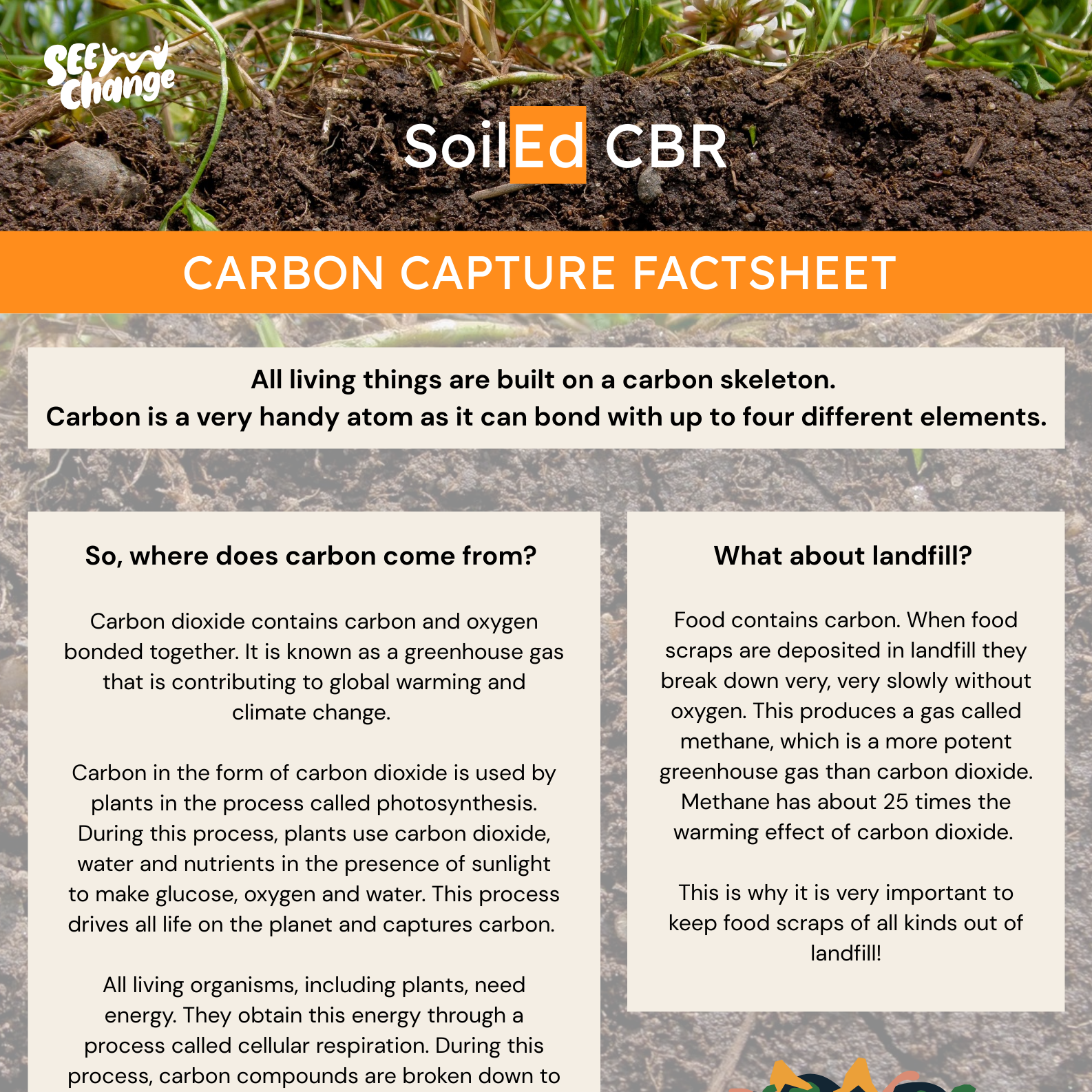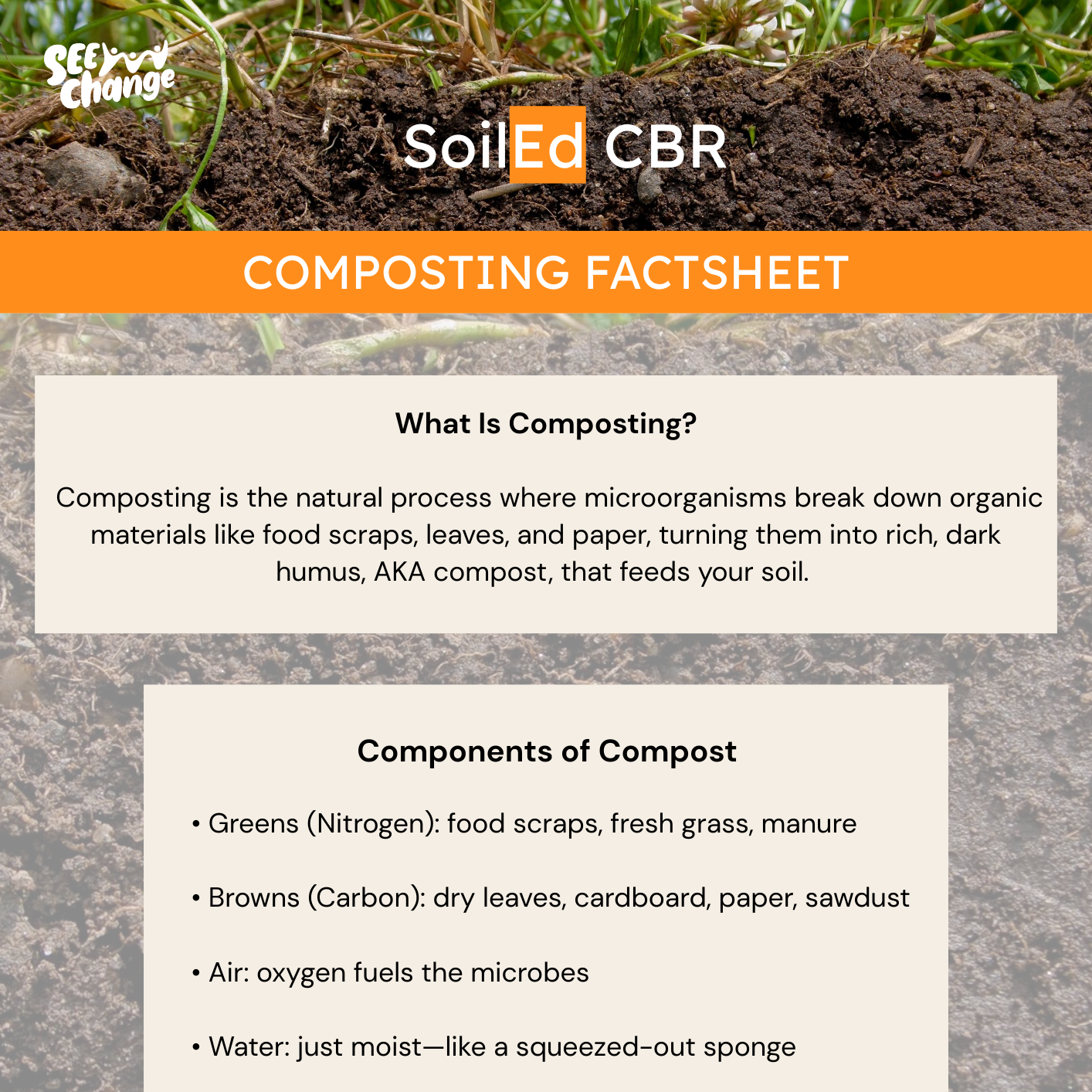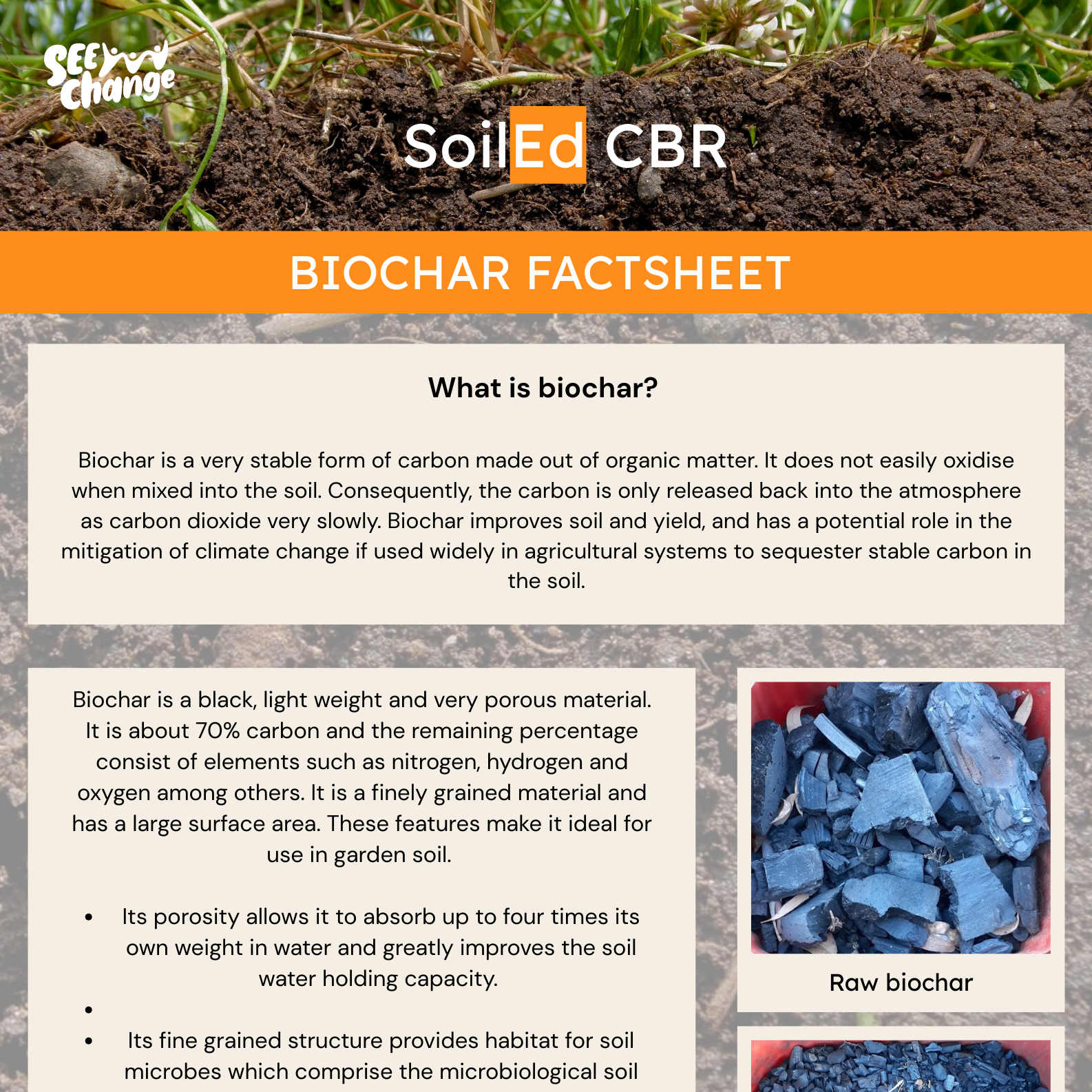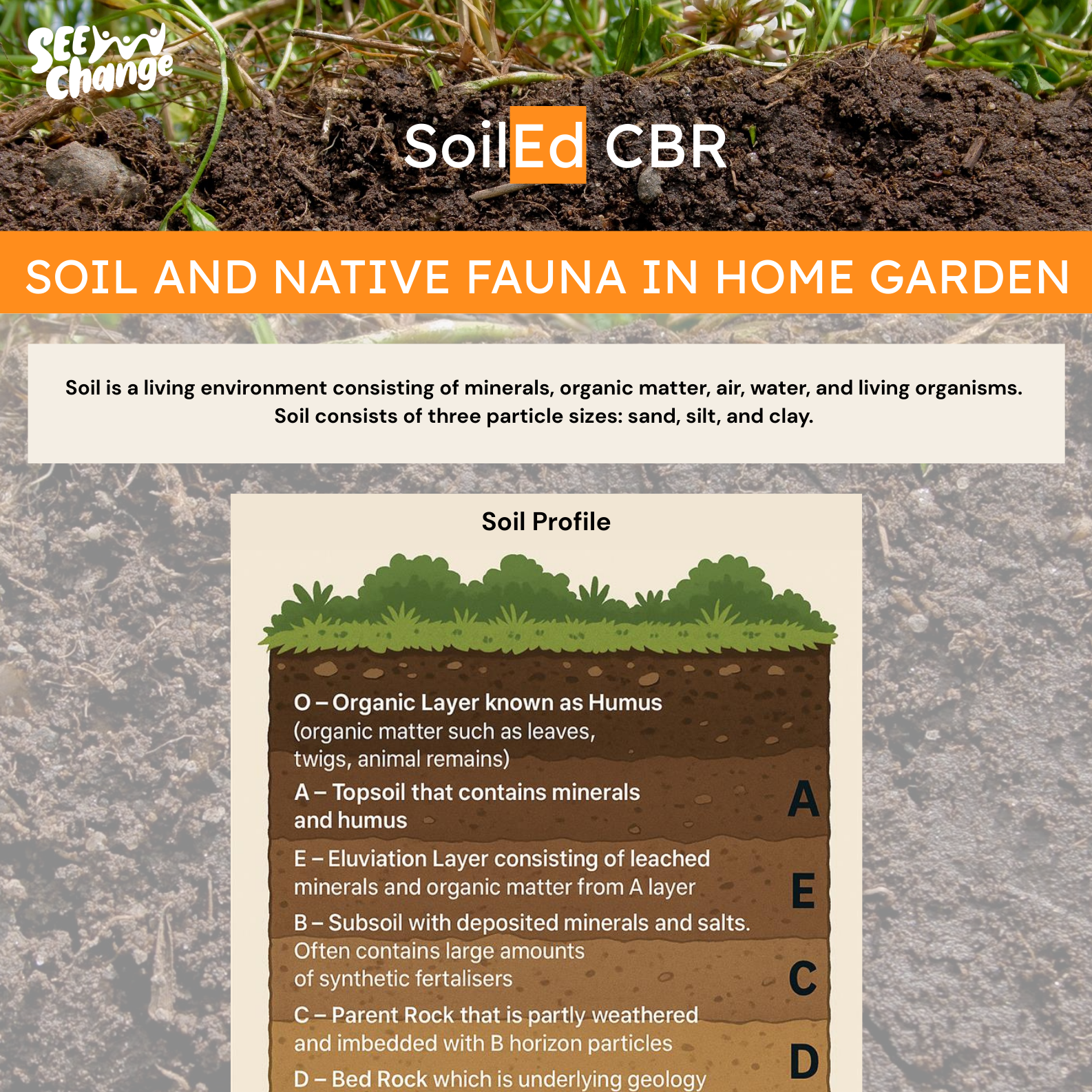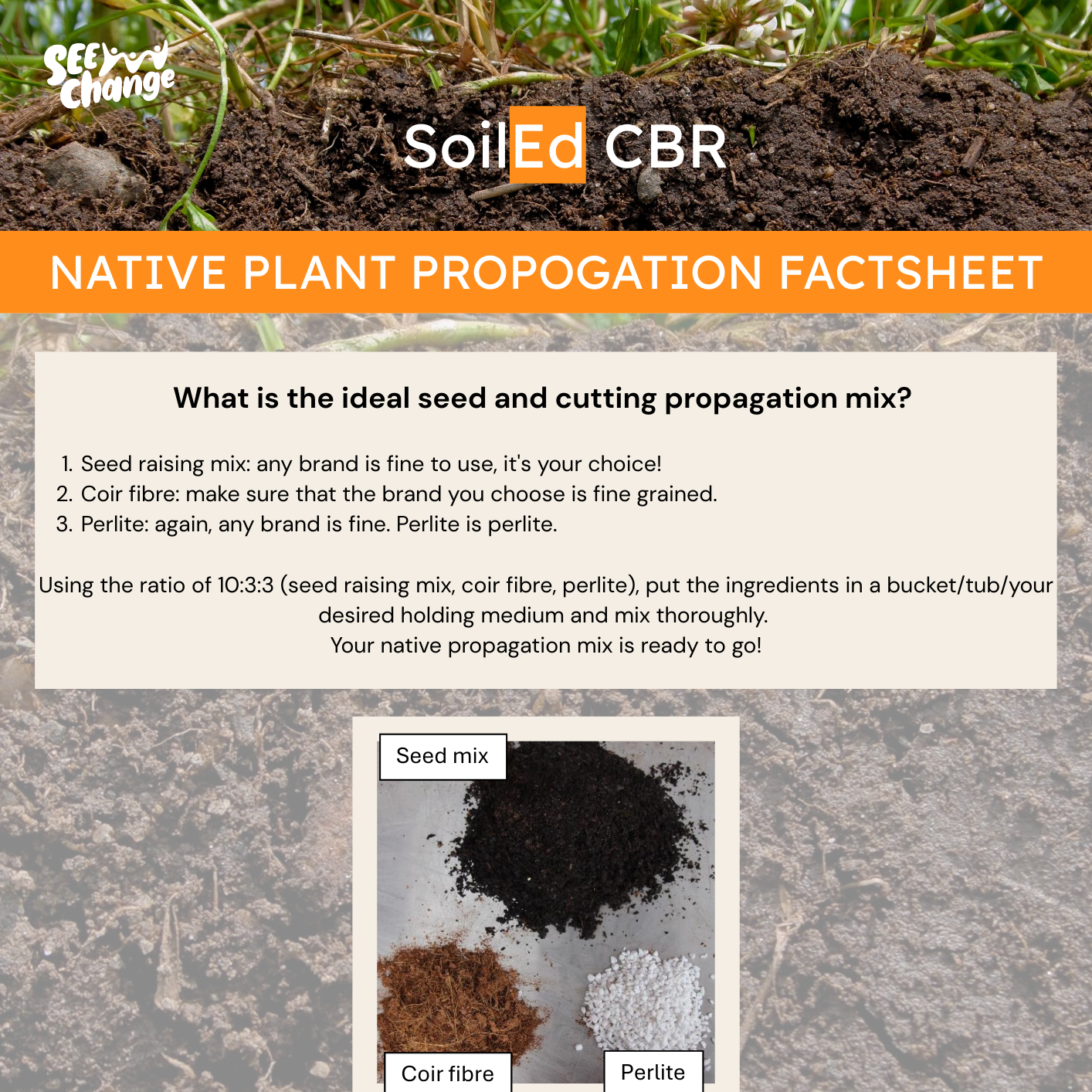SoilEd CBR
Soil Education — Home Grown in Canberra
From general information, to DIY guides, to different soil-related workshops on offer in Canberra, SoilEd CBR has you and your soil sorted!
-
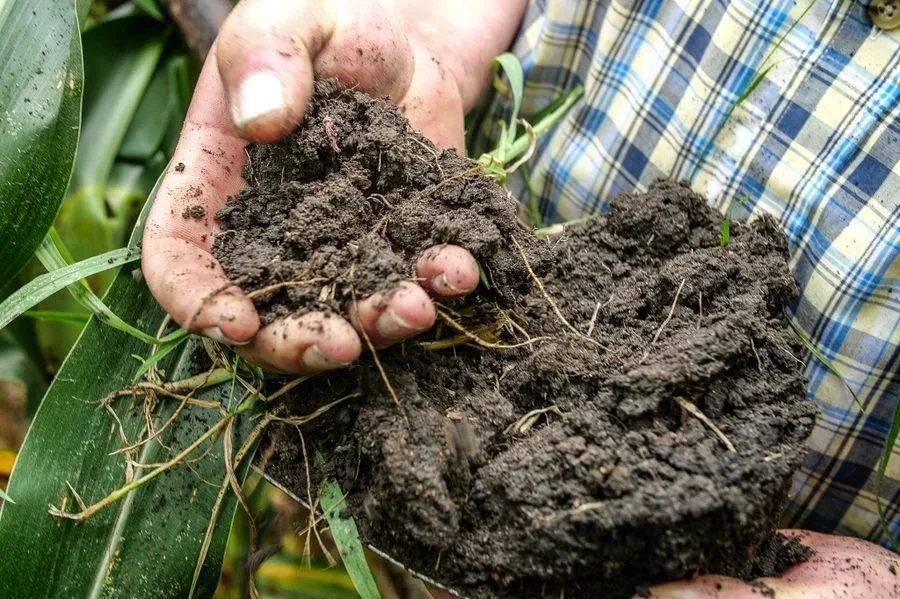
Soil Regeneration FAQs
Learn all about soil regeneration and why it’s important.
-
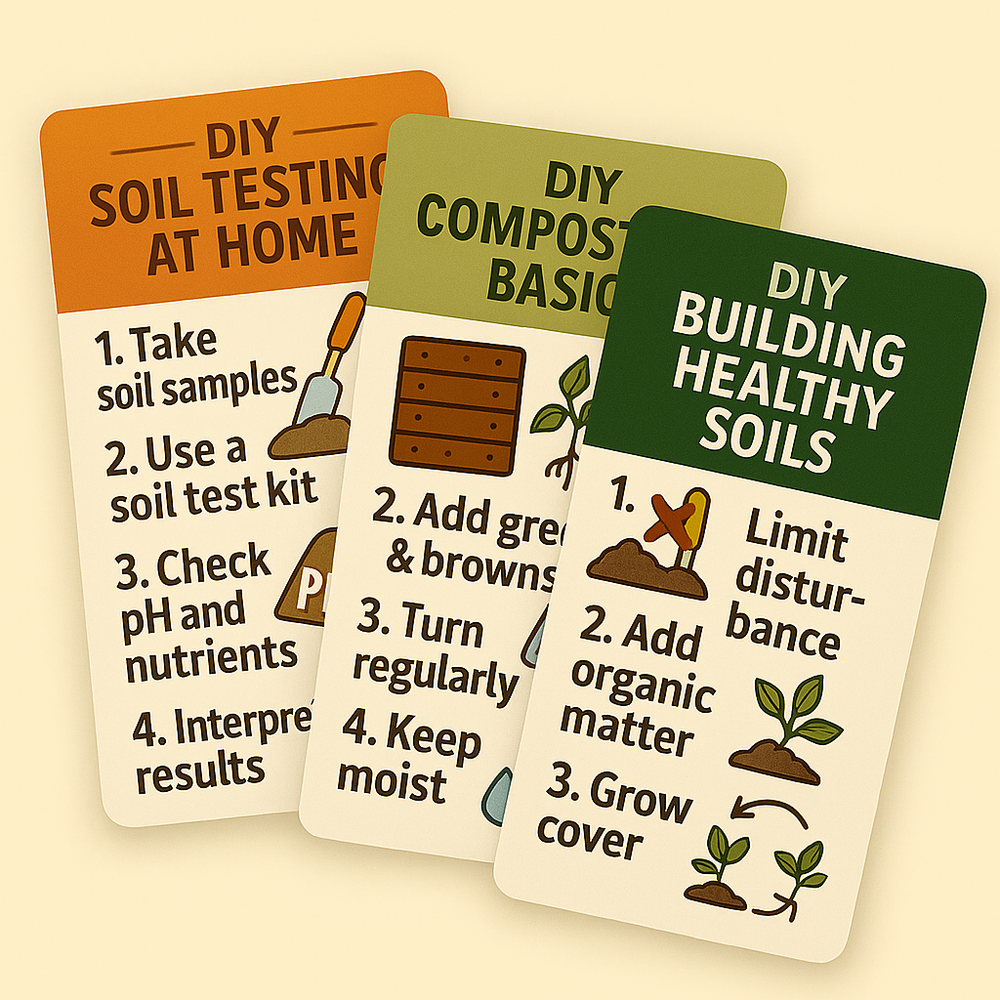
DIY Soil Regeneration Guides
Start regenerating your soils today with these useful DIY guides made by local soil experts.
-
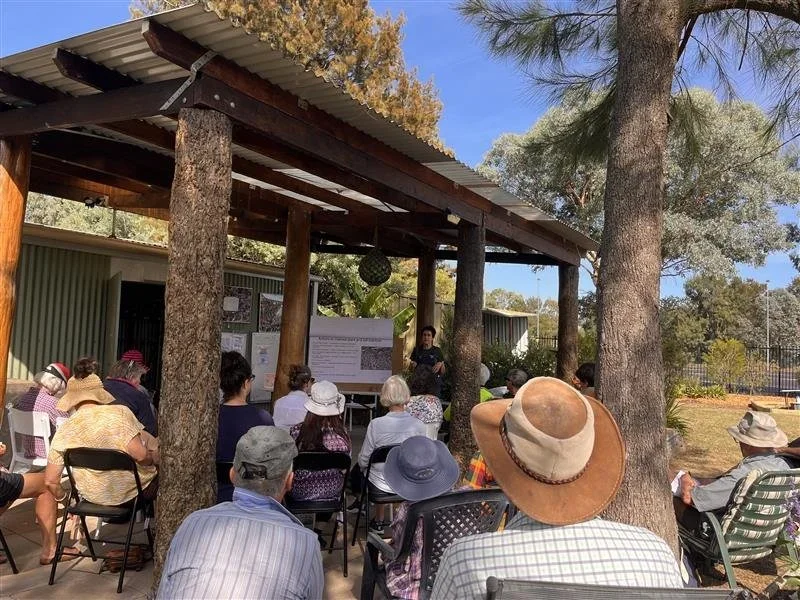
Soil-Related Workshops
Find out about the different soil-related workshops on offer in the ACT.
Soil Regeneration FAQs
Image: Teagasc
What is soil?
Soil is the thin layer of material that covers most of the land on Earth. It’s made up of a mix of tiny rock particles, organic matter (like decaying plants and animals), water, air, and living organisms like worms, fungi, and bacteria. It may look simple, but soil is teeming with life and activity!
Soil varies with the landscape. Different types of soils are classified depending on how much sand, clay, or silt they contain, and how much organic matter is present. These differences affect what can grow in a particular area and in turn what creatures will call that area home. Healthy soil is soft and crumbly, holds water well, and has a pleasant earthy smell.
Soil forms very slowly over time as rocks break down and organic materials build up. Because of this, it’s considered a non-renewable resource in human lifetimes and needs to be treated with great care.
Image: Soil Life
Why is soil important?
Soil is the foundation of nearly every ecosystem on the planet, providing important services that give rise to healthy plants, healthy people, and a healthy planet! Whether it is the food you eat, water you drink, air you breathe, climate you live in, medicines you take, matierals you use or natural environments you enjoy, almost everything humans need and want comes from the soil. Below are a few examples of the different services soil provides.
-
Soils are a key component of the carbon, nitrogen, and water cycles, impacting both the level of greenhouse gases (CO₂, CH₄, and N₂O) and water vapor in the atmosphere.
-
Soil produces the raw materials that form the base of our global economy, providing food, fiber, flowers, fuel, pharmaceuticals and more.
-
As water moves through the soil, clay and organic matter, which carry an electrical charge, bind to contaminants, removing them from the water.
-
As soil microbes feed on roots, residues, and organic matter and organisms prey on each other, nutrients are released for plant uptake.
-
Soil microbes, roots, and organisms that burrow through the soil stick particles together and build structure, allowing water to infiltrate the soil. The more clay and organic matter, the more water a soil can hold.
-
Plants use CO₂ to make sugars and proteins, some of which they pump out their roots to feed soil life. Living and dead biomass, decomposing plants, and animal residues store carbon underground, reducing CO₂ in the atmosphere.
-
Soils harbor ¼ of the world’s biodiversity. Over a billion organisms live in one handful of soil and 90% of insects spend a portion of their lives underground.
-
Soils support our homes, buildings, infrastructure, and parks. The type of soil (sand, clay, etc.) and its load-bearing capacity must be considered when laying a foundation.
-
Like chapters in a book, soils record the history of past climate and vegetation, as well as the rise and fall of civilizations.
How can we regenerate soil?
Regenerating soil means restoring it to a functioning and resilient state so it can continue supporting plants, storing water, and sequestering carbon. There are many different things we can do to regenerate soil.
One foundational step is adding organic matter: compost, aged manure, leaf mould, or mulch introduce food for microbes, improves water retention, and enhances soil structure.
Growing cover crops (such as legumes, grasses, or clovers) during off-seasons protects soil from erosion, adds root channels for air and water movement, and—in the case of legumes—fixes nitrogen from the air into the soil. Minimizing tillage preserves the delicate soil architecture and the habitats of soil organisms.
Diversifying plantings through crop rotation or intercropping prevents nutrient depletion, reduces pest outbreaks, and fosters balanced soil biology.
Incorporating biochar or rock powders can replenish trace minerals. In gardens and urban settings, simply avoiding walking on beds, using raised planters, and planting deep-rooted perennials can rebuild compacted or depleted soil over time.
By combining these practices—adding organic inputs, protecting soil cover, reducing disturbance, and diversifying plants—we can bring degraded soil back to life and ensure its productivity and resilience for generations to come.
DIY Soil Regeneration Guides
Carbon Capture Factsheet
Click to download ↓
Composting
Factsheet
Click to download ↓
Hugelkulture
How-To Guide
Click to download ↓
Biochar
Factsheet
Click to download ↓
Soil & Fauna in the Home Garden Factsheet
Click to download ↓
Native Plant Propagation
How-To Guide
Click to download ↓
Soil-Related Workshops in Canberra
Listed in alphabetical order
Biochar
With Canberra City Farm
In this workshop we will convert the farm's orchard prunings and other organic material into biochar for use in the gardens. This is a hands-on workshop where you will participate in:
loading the wood into the retort
firing up the retort
learning how to hydrate and inoculate the biochar
preparing soil under trees, and
applying the biochar to the soil
We will describe alternative ways of making biochar without using a retort. We will also discuss the advantages of adding hydrated and inoculated biochar to your garden soil.
Carbon & Soil
With Fiona Buining (Ainslie Urban Farm)
An introduction to the relationship between carbon and soil. This workshop builds an understanding of carbon in the atmosphere, soil and plants. You will learn about humus - what it is, how it is formed and the vital role it plays in your soil. Fiona will outline practical ways to capture carbon in your soil to build healthy soils and plants, and increase the water and nutrient holding capacity of your soil. This includes a range of composting methods and garden bed preparation.
Fiona runs a range of workshops centred around growing food and can tailor a workshop to your needs and interests. Please enquire for more information.
Caring for Your Soil Microbiology
With Canberra City Farm
How did nature build and maintained soil fertility before soluble salt fertilisers became available last century? We will introduce some of the remarkable microbes in the soil which built soil fertility over hundreds of millions of years before the invention of artificial fertilisers and we will explore how to use them in our own gardens.
Attendees will participate in collecting beneficial soil borne microbes from the local environment and brewing them to multiply their numbers. We will then apply those microbes to the soil to create a balanced microbiological soil ecology which is the key to growing healthy nutritious plants.
For this process to be successful it is essential to first create appropriate garden soil characteristics. This will be explored in the workshop "Understanding your Garden Soil".
Next scheduled workshop:
Canberra City Farm, Dairy Road
18 April 2026
Register here
Composting
With Canberra Environment Centre
The Canberra Environment Centre can deliver a wide range of tailored workshops and offerings on the topic of composting. Presentation topics can include:
Getting started with the basics of composting
Compost troubleshooting, myth busting and Q&A
Beyond the beginnings - building on your composting foundations
Workshops can be delivered in person and online and with you preferred balance of theory and practice.
Mycena interrupta. Photo by Dr Alison Pouliot
Dirt Matters — A Journey in the Mycosphere
With Dr Alison Pouliot
The need to produce high quality food while minimising environmental damage is one of the biggest challenges for Australian agriculturalists. Healthy biological soils are crucial to plant health including our food crops. In turn, human health depends on high food quality and hence good soil health.
Modern agriculture with its intensive use of chemicals, fertilisers and mechanical disturbance has largely eliminated soil organisms. However, innovative farmers and gardeners are turning things around by fostering fungi and other organisms within soils. Central to this is an understanding of symbioses between plants, fungi and their kin.
This talk provides an overview of the vital significance of fungi in soils and their roles in creating soil architecture, retaining water, increasing nutrient availability and maximising drought resistance. Greater attention to fungal-plant relationships can help us build resilience of our ecosystems, especially at a time of changing climate and water scarcity.
This is just one of about two dozen workshops on offer. Please enquire for further information.
Encouraging Native Biodiversity into the Home Garden
With Blake Canackle
In this workshop, participants will learn all about the interactions between native fauna and local soils and how to foster this connection in your home garden. From the blue banded bee to reptiles and the microscopic world, your home garden will be buzzing with life with Blake's practical tips!
The Garden that Waters Itself!
With Dr Cally Brennan
You're probably familiar with rain tanks and water wise plantings, but did you know there are heaps of other clever ways to keep your garden greener for longer using small scale passive water harvesting? This introductory workshop will open your eyes to the possibilities of water harvesting and how it can make your garden way more resilient in a changing climate.
Using the free power of gravity along with the right plants, passive water harvesting creates a living sponge to capture, store and use rainwater to build a resilient, vibrant garden for both wet and dry weather.
Contact Cally to arrange a workshop in her permaculture garden to learn about passive water harvesting and get a ‘behind the scenes’ tour of how everything works. You’ll walk away with lots of ideas on how to easily and sustainably water your garden. Cally is also happy to provide this workshop in other locations - please get in touch to discuss how we can tailor the content of this workshop to a specific site (for example, ideas for what could be done on your property etc.).
Native Plant Propagation
With Blake Canackle
In this workshop, participants will learn about different native propagation techniques and how to build and maintain healthy soil for native plants. Participants will then get to put their learnings into practice and propagate their own native plants to take home!
The Plant Health Pyramid
With Fiona Buining (Ainslie Urban Farm)
In this workshop, Fiona Buining will introduce the Plant Health Pyramid, a concept which explains the root cause of plant pests and diseases. This conceptual model, developed by John Kempf, is based on the fact that healthy plants produce healthy soils and vice versa. Specifically, Fiona will be covering what plants need for complete photosynthesis and the production of proteins, lipids, and bioactive compounds.
Upon completion of this workshop, you will understand how to grow plants that are resistant to pests and diseases and food that is nutrient dense and full of flavour, using regenerative practices.
Fiona runs a range of workshops centred around growing food and can tailor a workshop to your needs and interests. Please enquire for more information.
Understanding Your Garden Soil
With Canberra City Farm
In this workshop we will consider the characteristics of a fertile garden soil and how you can transform your soil to produce nutritious fruit and vegetables. You will be introduced to methods to assess:
the soil texture and structure of your soil and how it affects plant growth,
the chemical properties of your soil and how that affects the availablity of plant nutrients,
the microbiological properties of your soil which enhance the ability of plants to extract nutrients from the soil.
Methods to modify these soil characteristics will be briefly discussed.
Worm Farming
With Canberra Environment Centre
The Canberra Environment Centre can deliver a wide range of tailored workshops and offerings on the topic of worm farming. Presentation topics can include:
Getting started with the basics of worm farming
Worm farming troubleshooting, myth busting and Q&A
Beyond the beginnings - building on your worm farm foundations
Workshops can be delivered in person and online; information only, hands on or a combination of both.
SoilEd CBR was published in 2025 with assistance from the ACT Government under the Community Zero Emissions Grants Program.




